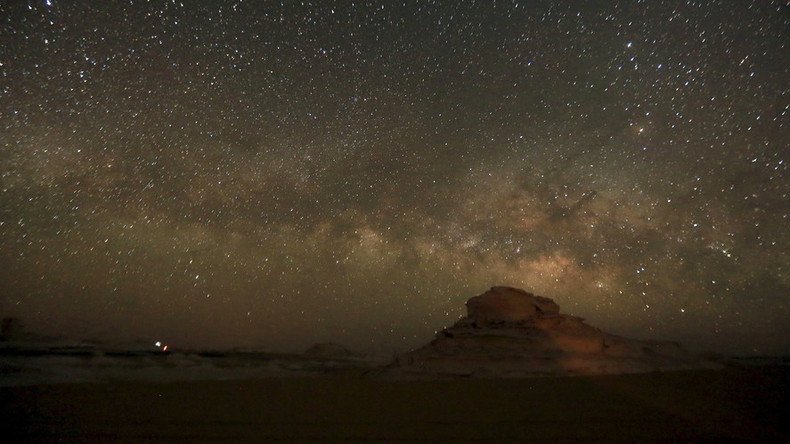Star light, star bright: Light pollution prevents 1/3 of world from seeing Milky Way

Man once looked to the stars for direction, answers and amusement. Today, most major city dwellers just see satellites in a night sky heavy in light pollution, a new study says. Vivid mapping of the world’s artificial light sources shows how big the problem is.
A study published in the journal Science Advances found that the bright lights of the big city may be affecting more of the world than previously thought.
A new atlas of artificial night sky brightness was released on Friday and found that the Milky Way – the galaxy in which we live – is invisible to 80 percent of North Americans.
While that may not sound great, it could be worse. The study found that Singapore has the worst light pollution. In fact, “the entire population lives under skies so bright that the eye cannot fully dark-adapt to night vision,” meaning the 5.5 million people living in Singapore never actually experience a natural night sky.
‘Sudden feedings’: Young stars undergo turbulent, violent phaseshttps://t.co/IVN7n9Xo3Vpic.twitter.com/jmIgscPCJk
— RT America (@RT_America) February 6, 2016
“The fact that we're bathing our planet in artificial light at night is a relatively new phenomenon, and it's essentially akin to a human experiment that we're only just beginning to understand the ramifications of,” Cheryl Ann Bishop, communications director for the International Dark-Sky Association, told NPR.
The researchers involved in the study explained the extent of the problem, saying, “Most of the world is affected by this problem, and humanity has enveloped our planet in a luminous fog that prevents most of Earth’s population from having the opportunity to view our galaxy.”
Light pollution is caused by light hitting molecules and particles in the atmosphere and scattering, particularly when light is directed upward like many older streetlamps, according to the National Park Service. In addition, the haze caused by exhaust and pollution that many city inhabitants see during the day also affects the night sky.
The light pollution affects areas with more industry, such as Kuwait, Saudi Arabia, South Korea, Israel and Argentina. All of these countries have almost entirely obstructed views of the night sky. Meanwhile, three-quarters of residents in Madagascar, Chad and Central African Republic go to sleep under skies unimpeded by artificial night light.
Light pollution has been on the fringes of what people consider pollution, Bishop told NPR. However, some research shows that artificial light can disrupt the world’s ecosystems.
Hubble Telescope’s ‘eagle eye’ camera finds new moon orbiting Pluto-like dwarf planethttps://t.co/LhYJOhGVd5pic.twitter.com/urpKWsVLyK
— RT America (@RT_America) April 28, 2016
For what some may consider a small problem, Chris Elvidge, a co-author of the study and a physical scientist for the National Oceanic and Atmospheric Administration, told the Washington Post that it is affecting millions.
“By now, we’ve had a couple generations of people in urban areas who have been cut off from seeing features like the Milky Way,” Elvidge said.
For example, baby turtles are born on the beach and move to the sea when they see the horizon over the ocean. But not knowing the difference between the sun and a lamp, the artificial light can confuse hatchlings and lead them astray.
Elvidge explained the potential emotional loss at stake for the generations of people who will never see the stars, stating, “…our ancestors and our civilization grew up with people literally studying the skies. At least when I’ve been out in places with a very clear sky, a dark sky, and you look up and see the number of stars out there, it’s awe-inspiring. I feel some enhanced connection to the cosmos.”












